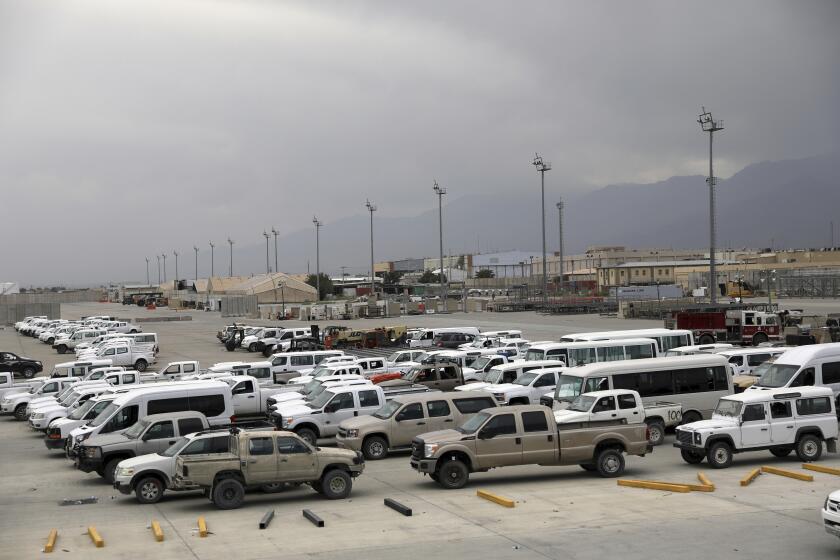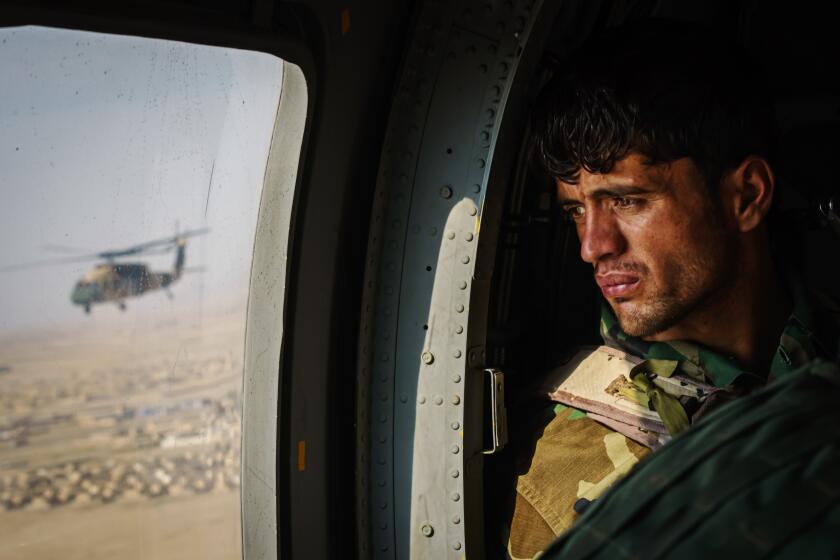As Taliban gains, Biden defends U.S. exit from Afghanistan, says it’s ahead of schedule

President Biden says ‘speed is safety’ as U.S. troops withdraw from Afghanistan and he defends his decision to end America’s longest war.
WASHINGTON — President Biden on Thursday defended his decision to withdraw U.S. forces from Afghanistan, challenging any critic to say whether “you would send your own son or daughter” to continue fighting in America’s longest war.
“I will not send another generation of Americans to war in Afghanistan with no reasonable expectation of achieving a different outcome,” he said during remarks from the East Room of the White House.
The withdrawal is ahead of schedule — “Speed is safety,” Biden explained — and expected to be complete by Aug. 31. The original deadline was Sept. 11, the anniversary of the Al Qaeda terrorist attacks that ignited the war two decades ago.
U.S. left the airfield near Kabul by slipping away at night without telling new commander, Afghan military officials say. Looters ransacked the barracks.
Biden’s defensive remarks reflected the second-guessing that has built since April, when he initially announced the U.S. drawdown. The Taliban, the radical Islamist group that ruled Afghanistan and harbored Al Qaeda before the war started, have gained ground across the country in anticipation of the Americans’ exit, while the U.S.-trained Afghan military has faltered. Many experts, including within the U.S. intelligence community, are fearful that the Afghan government could be toppled within months after American troops depart.
Such a collapse could allow the resurgent Taliban to retake power or set the stage for a chaotic civil war. Sen. Lindsey Graham (R-S.C.), a longtime supporter of extending U.S. military operations, warned that Afghanistan could see a replay of what happened in Iraq, where the Islamic State terrorist group filled a void after the American withdrawal, prompting the U.S. military to return.
“Get ready for major upheaval as this decision by President Biden is a disaster in the making,” Graham tweeted.
Biden insisted that Kabul’s fall is not inevitable. He expressed faith in the Afghan military despite its series of defeats on the battlefield, saying it was “as well equipped as any army in the world.” Now, he said, it was up to Afghan leaders to protect their country.
“They have the forces. They have the equipment,” he said. “The question is, will they do it?”
Biden conceded that the Taliban is stronger militarily than at any point since the U.S. invasion, and that Afghanistan might never have a central government in Kabul that’s able to control the expansive, tribal country.
“No nation has ever unified Afghanistan. No nation,” Biden said. “Empires have gone there and not done it.”
Administration officials are working to relocate Afghan translators and other contractors who helped U.S. forces and may be in danger from the Taliban, Biden said, and 2,500 special immigrant visas have been issued so far.
Directing remarks to the Afghan allies, he added, “There is a home for you in the United States, if you so choose. We will stand with you, just as you stood with us.”
The U.S. spent $8 billion building an Afghan air force in its own image. But how long can it last after American forces withdraw?
Biden said the goal of the U.S. invasion was not nation building but to kill Osama bin Laden, the Al Qaeda leader behind the Sept. 11, 2001, attacks who eventually died in a U.S. raid in Pakistan in 2011, and to prevent Afghanistan from being used again as a launchpad for terrorism against Americans.
“We accomplished both of those objectives,” he said. “Period.”
At the core of Biden’s remarks was his impassioned rebuttal to critics who say U.S. forces should remain in Afghanistan.
“How many thousands more American daughters and sons are you willing to risk? How long would you have them stay?” Biden said. “Already we have members of our military whose parents fought in Afghanistan 20 years ago. Would you send their children? Or their grandchildren as well? Would you send your own son or daughter?”
The public broadly supports the withdrawal, according to an April poll conducted by CBS News and YouGov, with 77% of Americans backing the decision to pull out.
“Congressional offices get no mail on this. There are no protest marches. No one runs attack ads. It’s just been invisible,” said Stephen Biddle, a professor at Columbia University and an adjunct senior fellow at the Council on Foreign Relations.
Yet withdrawal carries significant political risks. While a poll last fall for the Associated Press and NORC, a research institution at the University of Chicago, said 57% of Americans don’t follow any news about U.S. involvement in Afghanistan, that could change if the situation devolves rapidly, Biddle said.
“The only thing that will get a lot of Americans paying attention to this war,” he said, “is a catastrophe.”
More to Read
Get the L.A. Times Politics newsletter
Deeply reported insights into legislation, politics and policy from Sacramento, Washington and beyond. In your inbox three times per week.
You may occasionally receive promotional content from the Los Angeles Times.













